Interview Patrick Kasingsing
Images David Guerrero and Jar Concengco (metro.style)
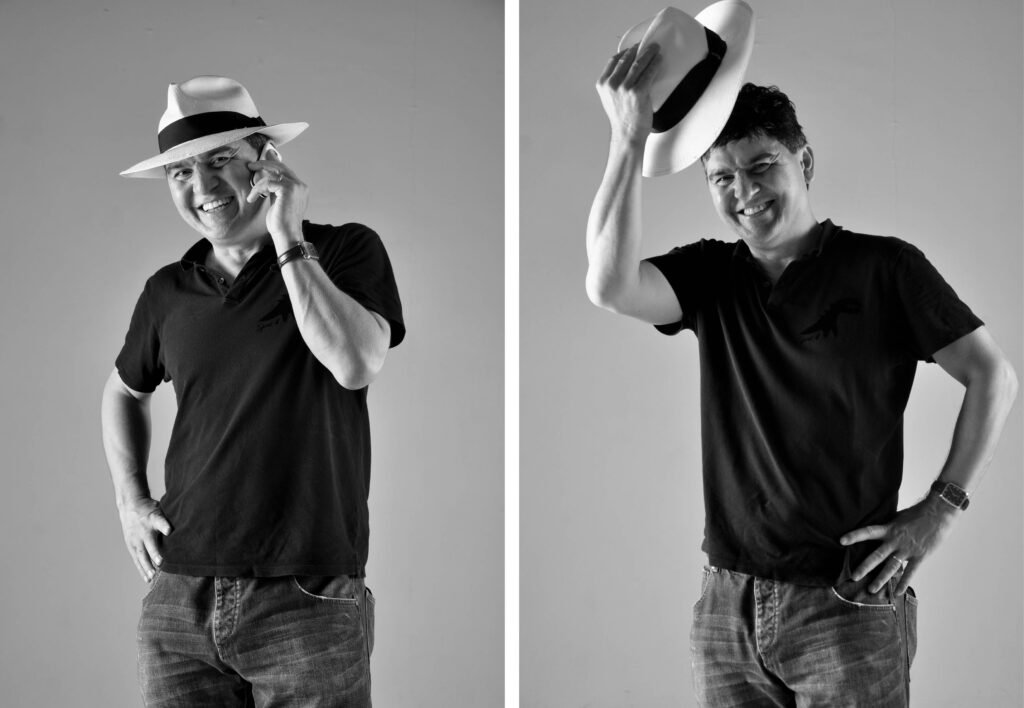

David! What’s your bedside read as of the moment?
I’ve just finished Virginia Woolf’s Orlando, which may sound a bit highbrow, but it came from watching the Netflix movie Vita and Virginia (2018) starring Elizabeth Debicki and Gemma Atherton. The film is, in some ways, the story of how the book Orlando came to be written. I think the relationship between an author’s work and their life is an interesting theme to follow, even if it’s not always easy to make the connection. Next up, I’m reading two books for ‘work’ which is my Harvard MLA Thesis on the Beatles in Manila in ’66. These are Imagining Manila by Tom Sykes, about how Manila has been perceived in the West through literature and journalism, and the Sovereign Trickster by Vince Rafael, which digs into the roots of our current political situation. And long overdue: I have a very dog-eared copy of Dogeaters by Jessica Hagedorn: a joyous reminder of how fiction can bring fact to life.
It is not surprising to find your affinity for books especially because of your family’s history and literary reputation, but barring that, why do you read? Was this a habit encouraged by your dad? Do you have a fond childhood memory of when you discovered your love for reading or was this something you picked up much later?
I did read quite a lot as a child. My mother gave me a copy of The Hobbit quite early on, and among my childhood favorite bedtime stories were the Wind in the Willows and The Little House on the Prairie. I think reading to kids is the best way to get them started. So whatever my other shortcomings as a parent, I did make sure to read stories to my daughter and son as they were growing up. Harry Potter and Lord of the Rings are among them. As a result, they do at least like audiobooks and podcasts as their favorite ways to consume stories.
As a multi-awarded creative and copywriter, stringing words together to create compelling narratives for a breakneck industry requires a ready arsenal of ideas; what do you do to keep inspired?
Funny you should mention that. I’ve just written a book on the subject called The you-have-to-go-through-a-lot-of-cr*p-to-get-to-good-ideas book. It’s going to be published in June by Milflores Publishing, headed by Andrea Pasion-Flores, and I’m very grateful to her for taking it on. The main inspiration is a saying called Sturgeon’s Law, which states that 90% of everything is cr*p. The corollary of that, which I think is quite inspiring – is that 10% of everything is not cr*p. So it’s a book about how to give yourself time, permission, and freedom to come up with ideas. You have to allow yourself to be bad – so that you can get to be good.
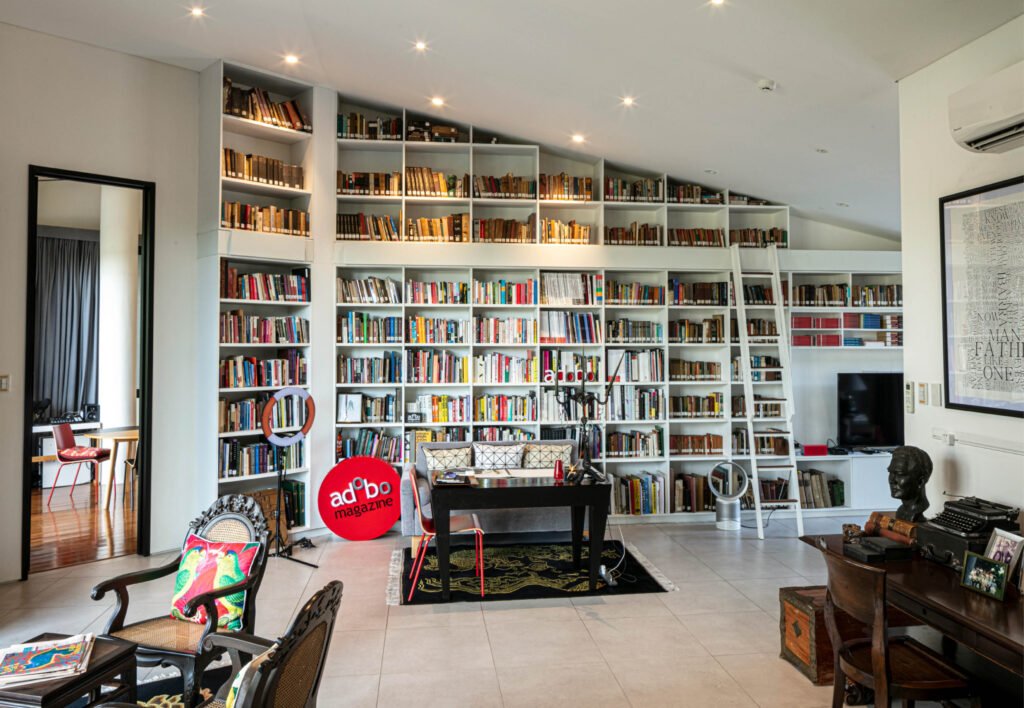

Let’s now talk about your library, which as I’ve seen from pictures, is quite a collection! I’m curious to know; some people usually have a library of books that do not necessarily relate to what they do for work; would this be the case for you? Is your library a refuge, a source, or an escape?
Well, it’s a number of things. But it’s a library that is over 50% inherited from my father and mother. It’s been professionally cataloged by some wonderful librarians about a decade ago and I’ve decided to focus it on literature and history – especially Philippine literature and history. As a result of this focus, we were able to donate a good number of books to the Ateneo library for use by students there. There are, additionally, a lot of books on advertising, art, and design. And there is a smaller mini-collection in my study, that has all the books that I’m currently referencing – or have recently referenced – for my degree. It’s a daunting pile and frankly, I think I need to start up an account on the books or something to start to let go of volumes I don’t need anymore and which other people do. I do like the idea that the Swedish have of letting go of possessions as you get older. According to a recent book by Margareta Magnusson, it’s called: “döstädning” — a combination of the word “dö” (which means death) and “standing” (which means cleaning). So yes, death-cleaning! This sounds morbid but I think it can also be life-affirming. As another book I read recently (4,000 Weeks by Oliver Burkeman) points out, we all have a tendency to try and do too many things and what we should be doing is only what really matters to us.
What surprising genres or titles will we find in your library?
Well, there is a great selection of manga from my daughter Kimi. And my wife Angel has an amazing collection of cookbooks and magazines. Finally, there are quite a few books on travel – with guides to places as diverse as Las Vegas and Bali.
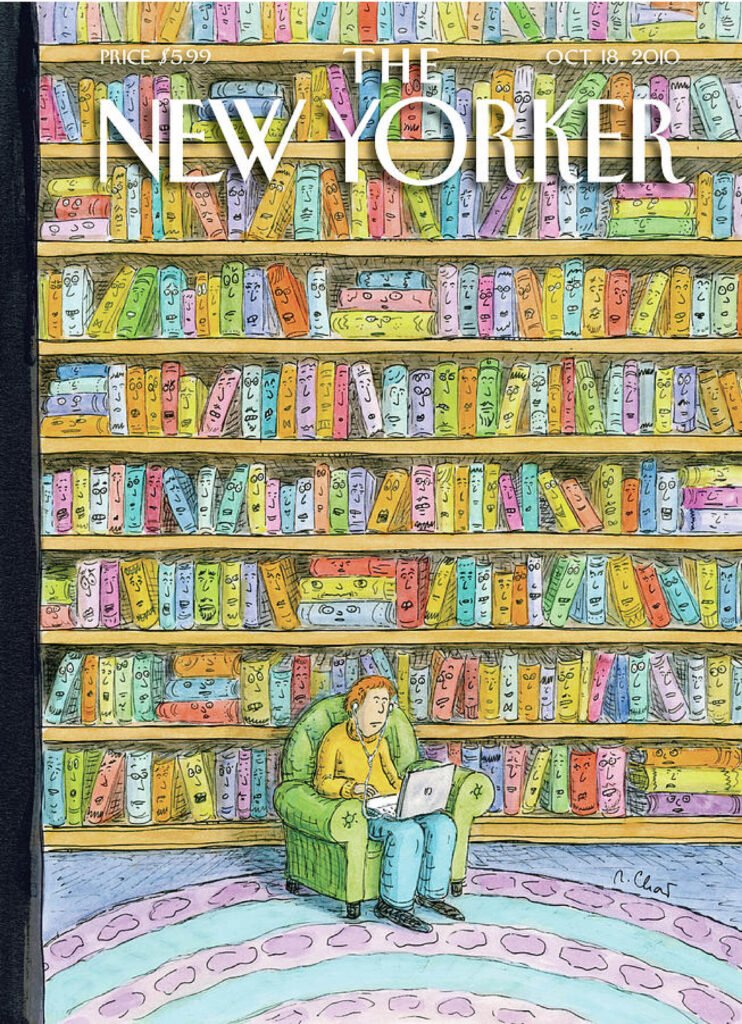

We see that you are a fan of physical tomes. Today’s libraries however are no longer exclusively physical. They can be just as expansive and diverse within our mobile devices and tablets. How would you describe your relationship with these two ‘libraries’? What are their pros and cons for you?
Great question. There’s a New Yorker cover showing a guy on a laptop in a library full of books. And a lot of the time it’s like that. But if you are creating something new, you need books to refer to. I find that digital references add to screen fatigue, compared to having physical copies of books. Also, there are studies that show reading from the printed page is retained better by the brain than reading from screens.
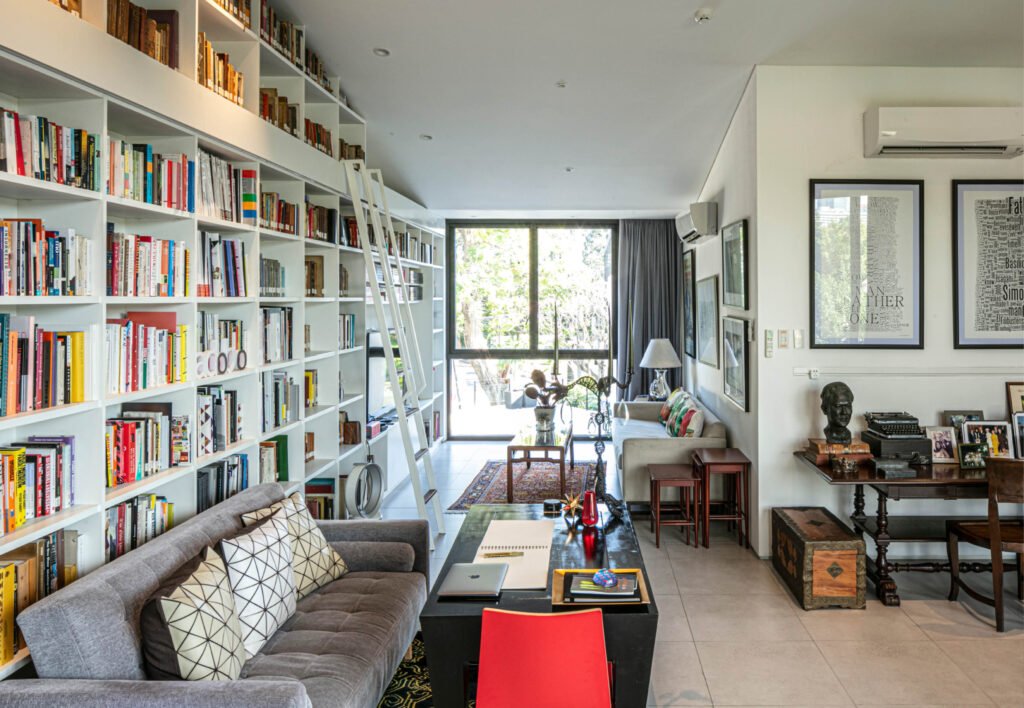



How does one become an effective and discerning reader, a vital skill in an age riddled with disinformation and short attention spans?
I think you need a reason to read and a defined area of interest. There are infinite numbers of books to read and very finite time in which to read them. So work out what you’re interested in and stick to that. If you enjoy a certain writer or genre of books, read those. If you are trying to find out about a subject, then specialize in those books. Then it won’t feel like work but more that you are pursuing your own interest.
You’ve done your share of copy work but what’s one writing project you’ve been raring to do or has eluded your grasp?
I’ve never written a screenplay or a novel. I’ve never written a play or a collection of essays. So there are lots of things I haven’t done and it’s probably easier to work out what I have done: loads of ads and commercials, some magazine and newspaper articles, a couple of book introductions, a radio program, a non-fiction book, and soon, a Masters Thesis. My plan is to turn the latter into a published non-fiction book. After that, I might try another one. And then if time permits I think I will try a screenplay or a novel. But obviously, I need to get a move on.


The role of books as a refuge for truth and knowledge cannot be stressed further in this age of widespread misinformation. What qualities would you say enable books to be ideal receptacles for ideas and effective mediums for spreading them?
Writing a book and going through the process of selling it to a serious publisher is a major undertaking. And doing so puts you in a position to tell a story accurately and with adequate reflection and confirmation. That’s not to say that books are infallible. There are many, many, horrible books. By which I mean books that may be well-written and skillfully crafted but fundamentally biased or dishonest. I try to avoid those books!
Your house is on fire, and you could save just one book from your library—what would it be? Why?
Our old house was indeed on fire at one point, and I can say now I didn’t bring any books! But if despite all our precautions, the same thing was to happen again, I would probably bring some reproductions of the hand-written copies of the Noli and Fili, not because they are irreplaceable but because they remind me of my dad’s work on translating the two novels – and his work on Rizal’s biography, The First Filipino.




What’s a book you previously enjoyed that you now find a hard time appreciating? (Or vice versa.)
I’m not sure I could bring myself to read Martin Amis’s book Money now. Not because it has got worse but just because it seems so much of a period piece. On the other hand, when I re-read White Teeth by Zadie Smith, I found it even better than I remembered. A portrait of life that so precisely captures what growing up in England is like.
Can you tell us a little more about your Beatles book project? Your love for the band is no secret (your eponymous ad agency had interiors inspired by Beatles’ songs), but what compelled you to pursue this book chronicling the band’s days in Manila specifically? What message do you want to be carried across?
You’re right, it’s no secret. I recently presented a BBC World Service radio documentary on the topic. I am pursuing this topic because it is an example of when the UK and the Philippines crossed paths in a really eventful kind of way. It should have gone well but it really didn’t. And it is instructive of how much potential there is for cross-cultural mix-ups even today. I want to present this study as a way to understand the Philippines, from both good and bad aspects, but in a way that is entertaining and fun to read. I’m getting there but it’s a lot harder than it first seemed. However as mentioned above I’m developing the story as part of my Master’s degree at Harvard Extension School, I’m getting amazing support from them – and from others, I’ve recruited to help me along the way. The lockdown made a lot of this possible because I had much more time at home than ever before. And now that we’re coming out of it my challenge is to get everything done before normal life kicks in again! •




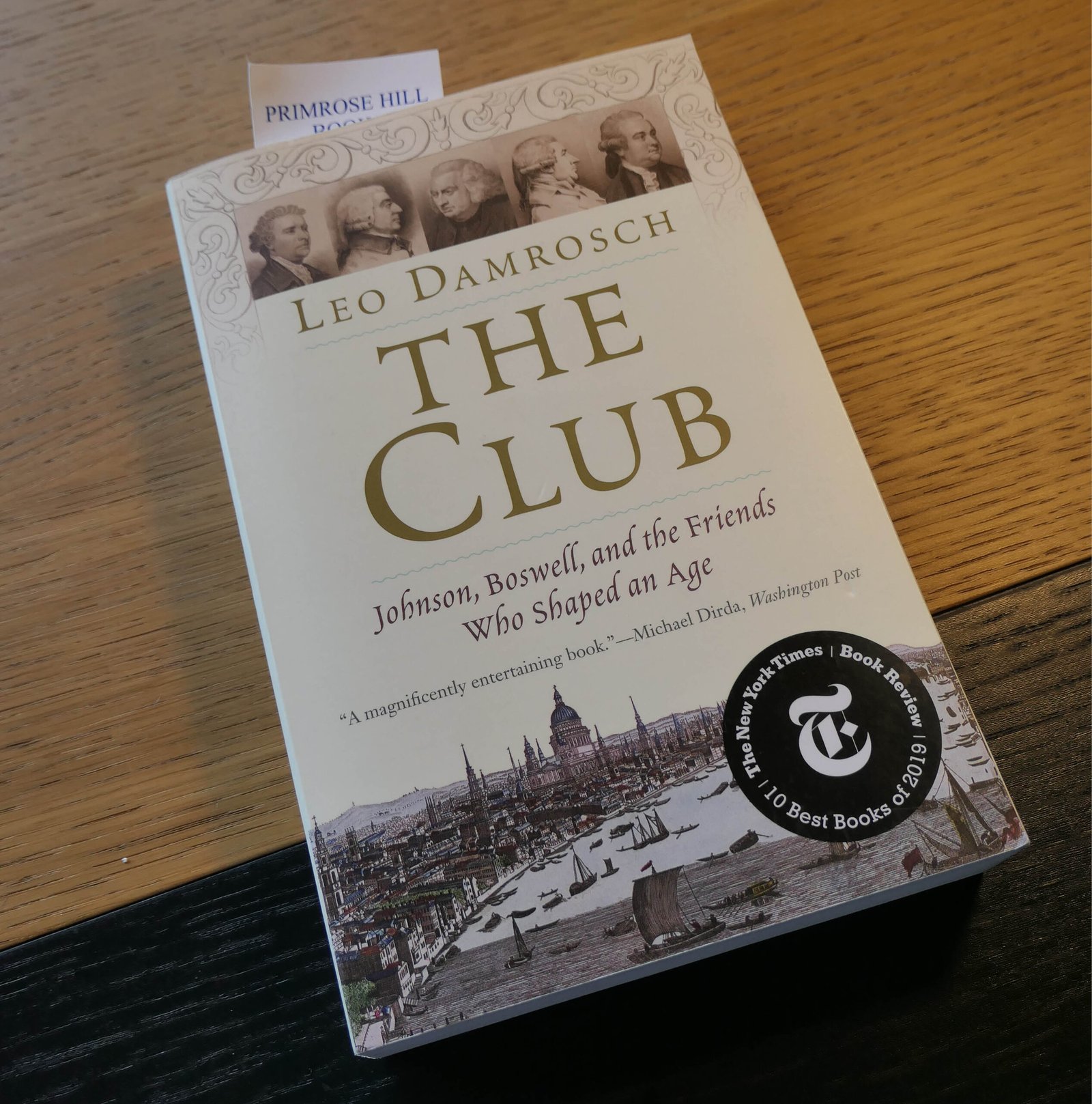

One Response